Wasps have a notorious reputation for their incredibly painful sting, which can also cause death on rare occasions. They also prey on pest insects such as ants, flies, and bugs. But while you can use insecticides to get rid of them, it is still better to just keep them away using the scents that they hate.
But, what are the scents wasps hate the most? Wasps hate basil, citronella, eucalyptus, peppermint, and wormwood. The scent of combined lemongrass, cloves, and geranium has also been proven effective in repelling wasps. Likewise, they also hate the smell of white vinegar.
Interestingly, there are other common household products and foods that can repel wasps. To know more about this, simply read further this article!
What Is the Difference Between Wasps, Bees, and Hornets?
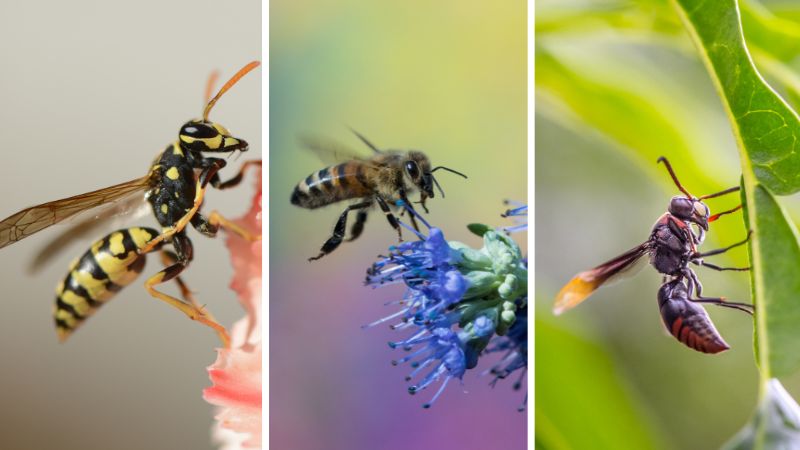
Bees, wasps, and hornets belong to the order Hymenoptera, which is one of the largest orders of insects. Although these three insects may look alike, you can also easily spot the difference between them.
Wasps are carnivores and eat small insects, while some bees are omnivores or eat both plants and animals. Both insects come in yellow and black colors. However, wasps have pointed lower abdomens and a narrow waist, while bees have round bodies.
Hornets are a type of wasp, and both of them have hairless bodies. However, wasps can grow from ⅓ inch to 1 inch and usually have black and yellow rings or stripes. Meanwhile, hornets are a bit bigger, and they have black and white bands and usually have lighter colors.
What Are the Most Common Wasps I Can Encounter?
Generally speaking, there are two different types of wasps—solitary and social. Solitary wasps cover the majority of wasps, and they don’t form colonies. Whereas social wasps have a queen that builds their nest. A single colony can have more than 5,000 wasps. Both of them only attack humans in self-defense.
There are more than 30,000 types of wasps all over the world. But so far, there are only three most common types of wasps that you encounter: the paper wasps, the yellow jackets, and the bald-faced hornets.
Here are the similarities and differences that you must know:
1. Paper Wasps
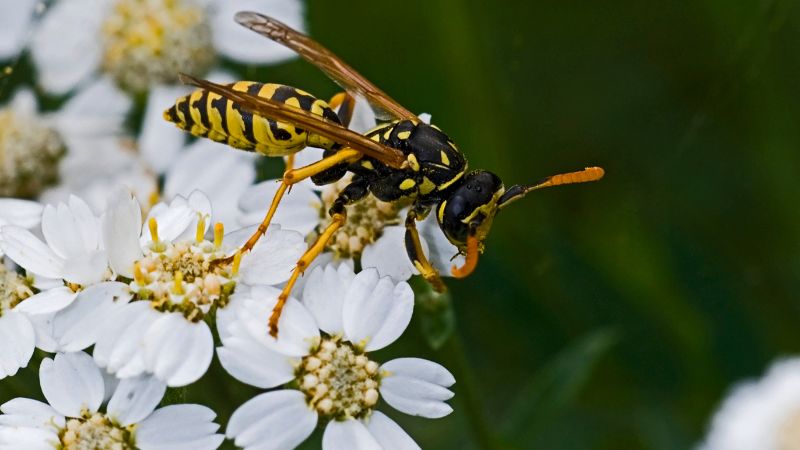
Paper wasps can be black, brown, red, or yellow, but most are brownish with yellow markings. They have a slender body and have long legs that are ½ to 1 inch long. These social wasps usually eat juices of fruits (ripe and overripe), as well as and nectar of flowers, and prey on small insects to feed their young.
Most paper wasps die in the winter, except for the new queens. They build nests under any horizontal surface with a papery pulp, hence their name. They are dubbed as “umbrella wasps” because of the shape of their nest. In most cases, they only sting you if they feel threatened.
2. Yellow Jackets
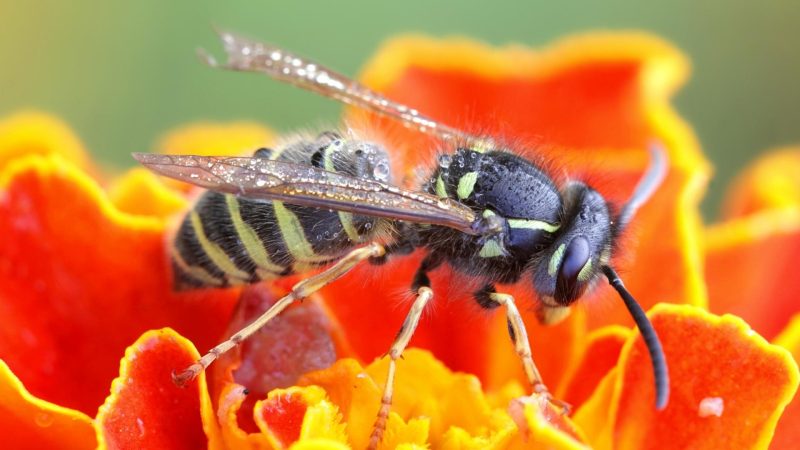
Yellow jackets are also social insects, and their colonies survive for only a year, just like paper wasps. They can grow between 3/8 inches and 5/8 inches long, and their bodies are usually bright yellow with black markings, which is why people usually mistaken them for bees.
These insects build their nest in secluded areas, either above or below the ground. Once it stings you, it will inject venom that will cause you sudden pain. But just like paper wasps, they will only sting you if you physically threaten them. Part of their defense mechanism is to sting multiple times. Moreover,
3. Bald-Faced Hornets
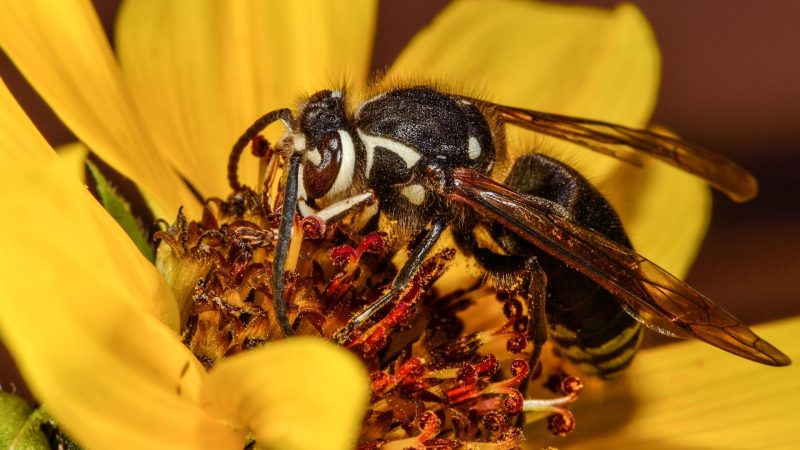
Bald-faced hornets are not hornets but rather another type of wasp. They are closely related to yellow jackets. Dubbed as “aerial yellow jackets,” these social wasps are large and can grow to about 7/8 inches long. Their body is usually black, while their face and end of the abdomen have white markings.
Just like yellow jackets, bald-faced hornets can also sting multiple times. They also inject venom, which makes their sting extremely painful. Their nests are covered in a papery shell and are usually found in bushes and trees, from 3 feet to 6 feet high.
How Dangerous Are Wasps?
Most wasp species inject venom when they sting. Unlike bees, they can sting multiple times without hurting themselves. If you get stung by one wasp, you may feel a burning sensation or sharp pain. It may also cause itching, redness, and swelling.
If a swarm of wasps attacks you, say 30 or 40 wasps, you can eventually die. Although deaths by wasp stings are very rare, this can happen to you if you are allergic to their venom. And again, they will only attack you once you disturb their nest. Nevertheless, wasps are still very dangerous to humans.
Related: Do Wasps Attack at Night? | Important Facts!
Essential Oils That Keep Wasps Away
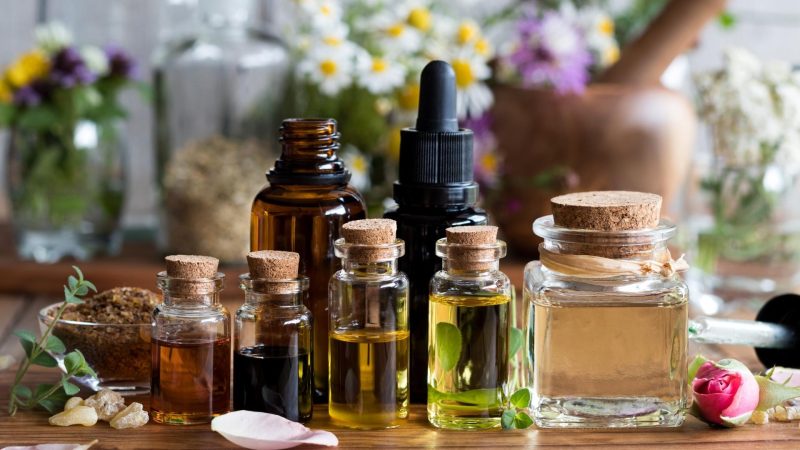
A lot of essential oils have also been proven effective in repelling insects, including wasps and bees. They contain bioactive compounds, and they emit aromatic scents wasps hate and may cause them to abandon their nest. Nevertheless, they are safe for humans and pets. Below are some of them:
- Basil
- Cedarwood
- Cinnamon
- Citronella
- Eucalyptus
- Lavender
- Lemongrass
- Peppermint
Related: Powerful Homemade Wasp and Bee Sprays (with Recipes)
Will a Wasp Leave On Its Own?
A wasp will leave on its own without you scaring it away. However, this can only happen in certain conditions. First, a wasp will leave an area if there is no source of food. Second, wasps don’t usually stay long in dark areas as they are known to be attracted to bright lights.
Also, killing a wasp may lead you to trouble. A dying wasp will release a chemical called pheromone, which can change the behavior of his comrades. If there is a swarm of wasps near it, they will attack you and will likely sting you.
Do Wasps Hate Apple Cider Vinegar?
No, in fact, they are very attracted to its sweet scent. As such, you can use apple cider vinegar to trap and kill them. Simply pour a few drops of dish soap into it, and stir the mixture gently. Then, place it near the wasp nest. Once the wasps land on the trap, they will slowly be suffocated and die.
Can White Vinegar Repel Wasps?
Yes. Unlike apple cider vinegar, it has a stronger sour scent, which is why wasps hate its smell so much. Simply mix it thoroughly with an equal amount of water, and spray it around your house. However, this mixture doesn’t kill wasps—it can only keep them away for a while.
Does Coffee Kill Wasps?
No, however, the strong smell of coffee grounds can be used as an insect repellent. It can repel wasps, bees, fleas, and mosquitoes. For better results, you burn the coffee grounds first before putting them slowly into the wasp’s nest.
Do Cucumbers Keep Wasps Away?
Cucumbers contain a chemical called cucurbitacin, which tastes bitter for some insects. So far, there is no scientific study to prove that cucumbers can repel wasps. However, a study suggested that cucumber peel can mildly repel ants, which are closely related to wasps and bees. Slices of cucumber may also work.
Does Garlic Kill Wasps?
Currently, there is no scientific evidence proving that wasps hate the smell of garlic. There is also limited research explaining the effectiveness of garlic as an ingredient in insecticides. Nevertheless, the garlic plant may repel fruit tree borers, Japanese beetles, spider mites, and weevils, as well as deer and rabbits.
Can WD40 Kill Wasps?
WD40 can kill wasps. Aside from being a well-known lubricant, it also kills wasps quickly and prevents them from building a nest. This petroleum-based spray blocks the spiracles on their exoskeletons, causing them to suffocate and die of poisoning.
Does Soapy Water Kill Wasps?
Yes. Just like WD40, a mixture of dishwashing soap and water will block their thorax and will prevent them from breathing. Note, however, that water alone may not drown wasps. Therefore, put more soap into the water and spray it on the flying wasps.
Can Clorox Kill Wasps?
Clorox kills wasps, just like how soap and water do. In fact, any strong bleach product can repel wasps, especially if a huge amount is mixed with water.
Spray it directly to their nest or while they are flying around you. However, wasps may not die instantly and will resort to attacking you. Make sure you can protect yourself.
Related: What to Do With a Wasp Sting? | All You Need to Know!
List of Sources
Hahn, J., Jesse, L., & Liesch, P. (2020). Wasps and bees. University of Minnesota Extension.
Potter, M. F. (2018). Controlling Wasps, Hornets, and Yellowjackets. University of Kentucky.
University of Connecticut. (2016). Essential Oils.
- Bed Bug Surge 2025: How to Detect, Prevent, and Safely Eliminate Infestations in Top U.S. Cities - June 18, 2025
- Asian Needle Ants Invade US Homes: 2025 Guide to Identification, Risks, and Effective Control - June 11, 2025
- New World Screwworm Alert: How US Livestock Owners Can Prevent Outbreaks and Protect Herds [Summer 2025 Update] - June 8, 2025
